2023-2024学年高一上学期英语人教版(2019)必修第一册写作句式多样化 晨读材料课件(共19张PPT)
文档属性
| 名称 | 2023-2024学年高一上学期英语人教版(2019)必修第一册写作句式多样化 晨读材料课件(共19张PPT) |  | |
| 格式 | pptx | ||
| 文件大小 | 109.9KB | ||
| 资源类型 | 教案 | ||
| 版本资源 | 人教版(2019) | ||
| 科目 | 英语 | ||
| 更新时间 | 2023-11-28 15:47:42 | ||
图片预览

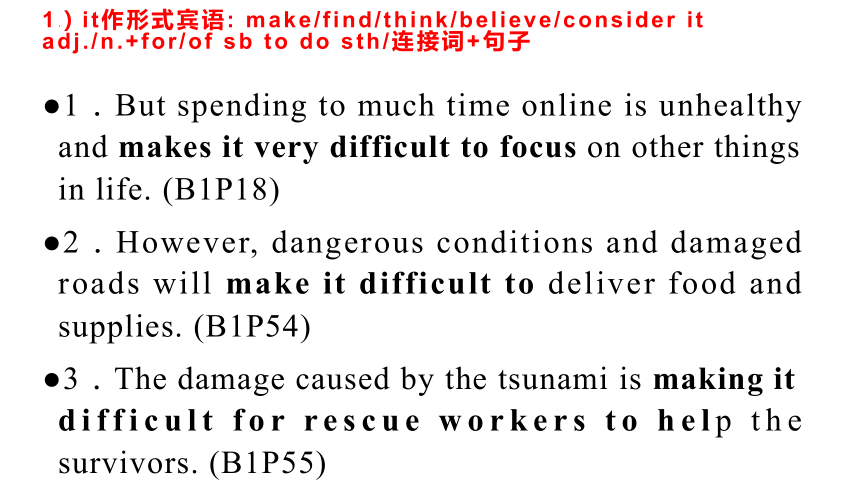

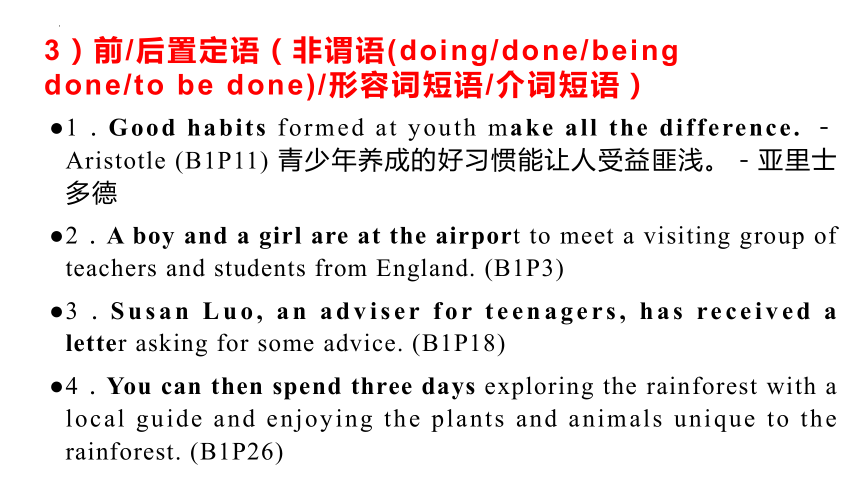
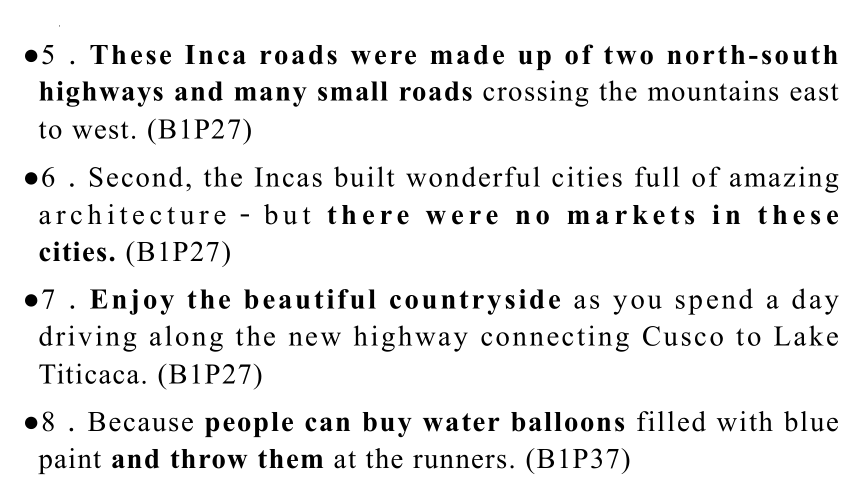
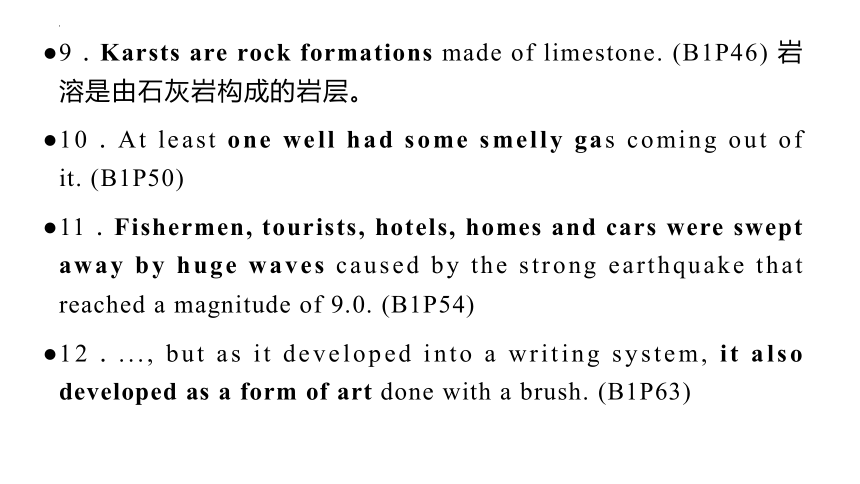
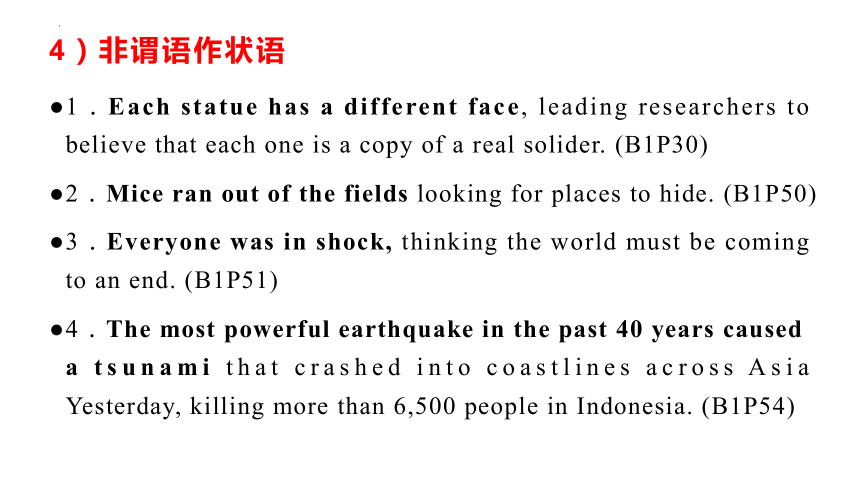
文档简介
(共19张PPT)
写作句式多样化
晨读材料
1)it作形式宾语: make/find/think/believe/consider it adj./n.+for/of sb to do sth/连接词+句子
1.But spending to much time online is unhealthy and makes it very difficult to focus on other things in life. (B1P18)
2.However, dangerous conditions and damaged roads will make it difficult to deliver food and supplies. (B1P54)
3.The damage caused by the tsunami is making it difficult for rescue workers to help the survivors. (B1P55)
2)when引导的句式: be about to do...when...; be doing...when...; had don...when...
1.I was having breakfast with my three children when water started filling my home. (B1P54)
3)前/后置定语(非谓语(doing/done/being done/to be done)/形容词短语/介词短语)
1.Good habits formed at youth make all the difference. -Aristotle (B1P11) 青少年养成的好习惯能让人受益匪浅。-亚里士多德
2.A boy and a girl are at the airport to meet a visiting group of teachers and students from England. (B1P3)
3.Susan Luo, an adviser for teenagers, has received a letter asking for some advice. (B1P18)
4.You can then spend three days exploring the rainforest with a local guide and enjoying the plants and animals unique to the rainforest. (B1P26)
5.These Inca roads were made up of two north-south highways and many small roads crossing the mountains east to west. (B1P27)
6.Second, the Incas built wonderful cities full of amazing architecture-but there were no markets in these cities. (B1P27)
7.Enjoy the beautiful countryside as you spend a day driving along the new highway connecting Cusco to Lake Titicaca. (B1P27)
8.Because people can buy water balloons filled with blue paint and throw them at the runners. (B1P37)
9.Karsts are rock formations made of limestone. (B1P46) 岩溶是由石灰岩构成的岩层。
10.At least one well had some smelly gas coming out of it. (B1P50)
11.Fishermen, tourists, hotels, homes and cars were swept away by huge waves caused by the strong earthquake that reached a magnitude of 9.0. (B1P54)
12...., but as it developed into a writing system, it also developed as a form of art done with a brush. (B1P63)
4)非谓语作状语
1.Each statue has a different face, leading researchers to believe that each one is a copy of a real solider. (B1P30)
2.Mice ran out of the fields looking for places to hide. (B1P50)
3.Everyone was in shock, thinking the world must be coming to an end. (B1P51)
4.The most powerful earthquake in the past 40 years caused a tsunami that crashed into coastlines across Asia Yesterday, killing more than 6,500 people in Indonesia. (B1P54)
5)非谓语作主语
1.Not knowing where I am going is what inspires me to travel it. (B1P25)
2.Losing games taught him to practise harder and never give up. (B1P38)
3.Losing two important players was a big challenge, but Lang Ping did not lose heart. (B1P38)
4.Having an emergency kit prepared is also very important. (B1P53)
6)as if/though; wish; if only (要是......就好了)引导虚拟:
1.It seemed as if the world were coming to an end. (B1P50)
2.I felt as if I had reached the goal that I had been fighting for. (B1P64)
7)定语从句
1.The team that Lang Ping had built was falling apart. (B1P38)
2.Workers built shelters for survivors whose homes had been destroyed. (B1P50)
3.Out of gratitude, many young adults who were students during the earthquake have chosen to study medicine or join the army in a wish to help more people. (B1P56)
4.Wenchuan, the county which/that was completely destroyed and then completely rebuilt, has become a symbol of the Chinese spirit of never giving up. (B1P56)
5.China is widely known for its ancient civilization which has continued all the way through into modern times, despite the man ups and downs in its history. (B1P62)
6.Over the years, the system developed into different forms, as it was a time when people were divided geographically, leading to many varieties of dialects and characters. (B1P62)
8)完全倒装
1.Below are two texts about Peru. (B1P26)
2.Especially amazing is the Incas' dry stone method of building. (B1P26)
3.Here are our first two choices. (B1P38)
4.Here is an entry from a commonly used dictionary. (B1P69)
9)非谓语作表语
1.My dream is to start my own IT company. (B1P8)
2....but my main goal is to find out which university is the best for me to attend. (B1P33)
3.Jordan says that the secret to his success is learning from his failures. (B1P38)
10)现在完成进行时(have/has been doing sth)
1.The Boys and Girls Club which started in Chicago has been helping young people since 1996. (B1P38)
2.I've been studying English since primary school. (B1P66)
11)宾语从句 (及物动词/介词/形容词+连接词+从句)
1.How you like to learn depends on what kind of person you are. (B1P10)
2.Tian Hua is not sure how well she will do at school this year, but she is not nervous any more. (B1P5)
3.Studying hard isn't always fun, but I'll be well prepared for university or whatever else comes in the future. (B1P14)
4.This helps you to relate what you read to what you already know and to understand the new text. (B1P38)
12)it作形式主语
1.It is not unusual for teenagers of your generation to be attracted to computer games and online world. (B1P18)
2.It is amazing that there are more than 8,000 statues, and no one in modern times knew about them until the 1970s. (B1P30)
3.It is believed that Chinese calligraphy dates back to at least the Han Dynasty (202 BCE-220 CE). (B1P63)
13)with的复合结构
PERU is a country on the Pacific coast of South America with three main areas: narrow, dry, flat land running along the coast, the Andes Mountains, and the Amazon rainforest. (B1P26)
14) should引导的虚拟(一坚持(insist),二命令(order/command),四建议(suggest/propose/advise/recommend),五要求(demand/require/request/ask/urge)
1.My adviser recommended that I should sign up for advanced literature. (B1P14)
2.I recommend that you (should) talk to your friend about his behaviour. (B1P18)
15) 省略句
1.I take noes while listening and reading. (B1P7)
16)强调句
1.It is for this reason that Spanish is the main official language of Peru. (B1P26)
17)状语从句
1.No matter what you want to learn, it is important to decide on your goal before you make a plan. (B1P10)
2.Even today, no matter where Chinese people live or what dialect they speak, they can all still communicate in writing. (B1P62)
写作句式多样化
晨读材料
1)it作形式宾语: make/find/think/believe/consider it adj./n.+for/of sb to do sth/连接词+句子
1.But spending to much time online is unhealthy and makes it very difficult to focus on other things in life. (B1P18)
2.However, dangerous conditions and damaged roads will make it difficult to deliver food and supplies. (B1P54)
3.The damage caused by the tsunami is making it difficult for rescue workers to help the survivors. (B1P55)
2)when引导的句式: be about to do...when...; be doing...when...; had don...when...
1.I was having breakfast with my three children when water started filling my home. (B1P54)
3)前/后置定语(非谓语(doing/done/being done/to be done)/形容词短语/介词短语)
1.Good habits formed at youth make all the difference. -Aristotle (B1P11) 青少年养成的好习惯能让人受益匪浅。-亚里士多德
2.A boy and a girl are at the airport to meet a visiting group of teachers and students from England. (B1P3)
3.Susan Luo, an adviser for teenagers, has received a letter asking for some advice. (B1P18)
4.You can then spend three days exploring the rainforest with a local guide and enjoying the plants and animals unique to the rainforest. (B1P26)
5.These Inca roads were made up of two north-south highways and many small roads crossing the mountains east to west. (B1P27)
6.Second, the Incas built wonderful cities full of amazing architecture-but there were no markets in these cities. (B1P27)
7.Enjoy the beautiful countryside as you spend a day driving along the new highway connecting Cusco to Lake Titicaca. (B1P27)
8.Because people can buy water balloons filled with blue paint and throw them at the runners. (B1P37)
9.Karsts are rock formations made of limestone. (B1P46) 岩溶是由石灰岩构成的岩层。
10.At least one well had some smelly gas coming out of it. (B1P50)
11.Fishermen, tourists, hotels, homes and cars were swept away by huge waves caused by the strong earthquake that reached a magnitude of 9.0. (B1P54)
12...., but as it developed into a writing system, it also developed as a form of art done with a brush. (B1P63)
4)非谓语作状语
1.Each statue has a different face, leading researchers to believe that each one is a copy of a real solider. (B1P30)
2.Mice ran out of the fields looking for places to hide. (B1P50)
3.Everyone was in shock, thinking the world must be coming to an end. (B1P51)
4.The most powerful earthquake in the past 40 years caused a tsunami that crashed into coastlines across Asia Yesterday, killing more than 6,500 people in Indonesia. (B1P54)
5)非谓语作主语
1.Not knowing where I am going is what inspires me to travel it. (B1P25)
2.Losing games taught him to practise harder and never give up. (B1P38)
3.Losing two important players was a big challenge, but Lang Ping did not lose heart. (B1P38)
4.Having an emergency kit prepared is also very important. (B1P53)
6)as if/though; wish; if only (要是......就好了)引导虚拟:
1.It seemed as if the world were coming to an end. (B1P50)
2.I felt as if I had reached the goal that I had been fighting for. (B1P64)
7)定语从句
1.The team that Lang Ping had built was falling apart. (B1P38)
2.Workers built shelters for survivors whose homes had been destroyed. (B1P50)
3.Out of gratitude, many young adults who were students during the earthquake have chosen to study medicine or join the army in a wish to help more people. (B1P56)
4.Wenchuan, the county which/that was completely destroyed and then completely rebuilt, has become a symbol of the Chinese spirit of never giving up. (B1P56)
5.China is widely known for its ancient civilization which has continued all the way through into modern times, despite the man ups and downs in its history. (B1P62)
6.Over the years, the system developed into different forms, as it was a time when people were divided geographically, leading to many varieties of dialects and characters. (B1P62)
8)完全倒装
1.Below are two texts about Peru. (B1P26)
2.Especially amazing is the Incas' dry stone method of building. (B1P26)
3.Here are our first two choices. (B1P38)
4.Here is an entry from a commonly used dictionary. (B1P69)
9)非谓语作表语
1.My dream is to start my own IT company. (B1P8)
2....but my main goal is to find out which university is the best for me to attend. (B1P33)
3.Jordan says that the secret to his success is learning from his failures. (B1P38)
10)现在完成进行时(have/has been doing sth)
1.The Boys and Girls Club which started in Chicago has been helping young people since 1996. (B1P38)
2.I've been studying English since primary school. (B1P66)
11)宾语从句 (及物动词/介词/形容词+连接词+从句)
1.How you like to learn depends on what kind of person you are. (B1P10)
2.Tian Hua is not sure how well she will do at school this year, but she is not nervous any more. (B1P5)
3.Studying hard isn't always fun, but I'll be well prepared for university or whatever else comes in the future. (B1P14)
4.This helps you to relate what you read to what you already know and to understand the new text. (B1P38)
12)it作形式主语
1.It is not unusual for teenagers of your generation to be attracted to computer games and online world. (B1P18)
2.It is amazing that there are more than 8,000 statues, and no one in modern times knew about them until the 1970s. (B1P30)
3.It is believed that Chinese calligraphy dates back to at least the Han Dynasty (202 BCE-220 CE). (B1P63)
13)with的复合结构
PERU is a country on the Pacific coast of South America with three main areas: narrow, dry, flat land running along the coast, the Andes Mountains, and the Amazon rainforest. (B1P26)
14) should引导的虚拟(一坚持(insist),二命令(order/command),四建议(suggest/propose/advise/recommend),五要求(demand/require/request/ask/urge)
1.My adviser recommended that I should sign up for advanced literature. (B1P14)
2.I recommend that you (should) talk to your friend about his behaviour. (B1P18)
15) 省略句
1.I take noes while listening and reading. (B1P7)
16)强调句
1.It is for this reason that Spanish is the main official language of Peru. (B1P26)
17)状语从句
1.No matter what you want to learn, it is important to decide on your goal before you make a plan. (B1P10)
2.Even today, no matter where Chinese people live or what dialect they speak, they can all still communicate in writing. (B1P62)
